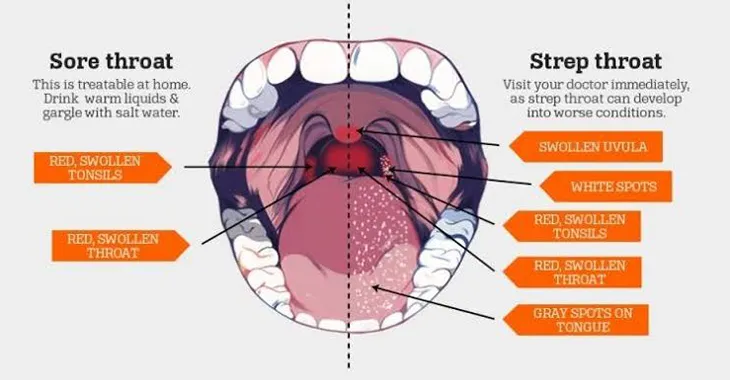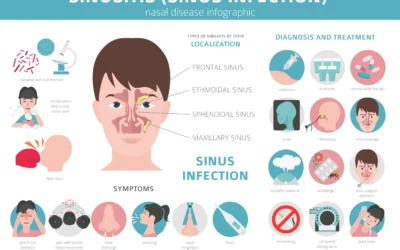Introduction
Tonsillitis and strep throat are two common throat infections that cause pain, inflammation, and discomfort. While they share similar symptoms, they are caused by different pathogens and require different treatment approaches. Understanding the differences between these conditions can help in early diagnosis and effective management.

Understanding Tonsillitis and Strep Throat
What is Tonsillitis?
Tonsillitis is the inflammation of the tonsils, the two lymph nodes located at the back of the throat. It can be caused by viral or bacterial infections and affects people of all ages, especially children and teenagers.
What is Strep Throat?
Strep throat is a bacterial infection caused by Streptococcus pyogenes (Group A Streptococcus). Unlike tonsillitis, which can be viral or bacterial, strep throat is always bacterial and requires antibiotic treatment.
Causes of Tonsillitis and Strep Throat
| Condition | Cause |
|---|---|
| Tonsillitis | Viruses (most common), Bacteria (including Streptococcus) |
| Strep Throat | Group A Streptococcus bacteria |
Viral Causes of Tonsillitis
- Influenza virus
- Adenovirus
- Epstein-Barr virus (causes mononucleosis)
- Rhinovirus (common cold virus)
Bacterial Causes of Tonsillitis
- Group A Streptococcus (same bacteria that cause strep throat)
- Other types of streptococcal bacteria
Symptoms Comparison
While both conditions affect the throat, some key symptoms distinguish them.
| Symptom | Tonsillitis | Strep Throat |
| Sore Throat | Yes | Yes (usually more severe) |
| Fever | Yes | Yes (often high fever) |
| Swollen Tonsils | Yes | Yes |
| White Patches on Tonsils | Sometimes | Yes (often with red spots) |
| Cough | Yes | No |
| Runny Nose | Yes | No |
| Difficulty Swallowing | Yes | Yes |
| Headache | Sometimes | Yes |
| Swollen Lymph Nodes | Yes | Yes |
| Nausea or Vomiting | Sometimes (in children) | Sometimes (in children) |
Diagnosis and Medical Tests
To confirm whether a patient has tonsillitis or strep throat, healthcare providers may perform the following tests:
- Physical Examination: Checking for swollen tonsils, redness, and white patches.
- Throat Swab Test: A rapid strep test can detect Streptococcus bacteria within minutes.
- Throat Culture: A more accurate test that takes 24-48 hours.
- Blood Test: If mononucleosis is suspected, a doctor may order a blood test.
Treatment Options
Tonsillitis Treatment
Viral Tonsillitis:
- Rest and hydration
- Over-the-counter pain relievers (Ibuprofen, Acetaminophen)
- Gargling warm saltwater
- Throat lozenges and warm tea
- Humidifiers to keep air moist
Bacterial Tonsillitis:
- Antibiotics (Penicillin or Amoxicillin)
- Pain relief medications
- If recurrent, a tonsillectomy (surgical removal of tonsils) may be recommended
Strep Throat Treatment
- Antibiotics: Penicillin, Amoxicillin, or other alternatives for penicillin-allergic patients
- Pain relievers: Ibuprofen or Acetaminophen to reduce fever and throat pain
- Fluids and Rest: Staying hydrated and getting enough sleep aids recovery
- Avoiding Contagion: Strep throat is highly contagious; patients should avoid close contact until 24 hours after starting antibiotics

Home Remedies and Lifestyle Changes
Regardless of the condition, home remedies can ease discomfort and speed recovery:
- Saltwater Gargle: Helps reduce swelling and kill bacteria.
- Honey and Warm Tea: Soothes throat pain.
- Hydration: Drinking plenty of fluids prevents throat dryness.
- Avoid Irritants: Smoking and pollution can worsen symptoms.
- Rest: Sleep supports the immune system in fighting infection.
Prevention Tips
To reduce the risk of tonsillitis and strep throat:
- Practice Good Hygiene: Wash hands regularly to prevent infections.
- Avoid Close Contact with Sick Individuals: Strep throat spreads easily through saliva and respiratory droplets.
- Strengthen the Immune System: A healthy diet, regular exercise, and sufficient sleep help the body fight infections.
- Avoid Sharing Utensils: Cups, straws, and eating utensils should not be shared to prevent transmission.
- Consider a Tonsillectomy: If chronic or recurrent tonsillitis occurs frequently, surgery may be an option.
Conclusion
Tonsillitis and strep throat share many symptoms but have distinct causes and treatment methods. While tonsillitis can be viral or bacterial, strep throat is strictly bacterial and requires antibiotics. Understanding the differences can help in seeking timely and effective treatment. If you experience persistent or severe throat pain, consult a healthcare provider for accurate diagnosis and appropriate care.

